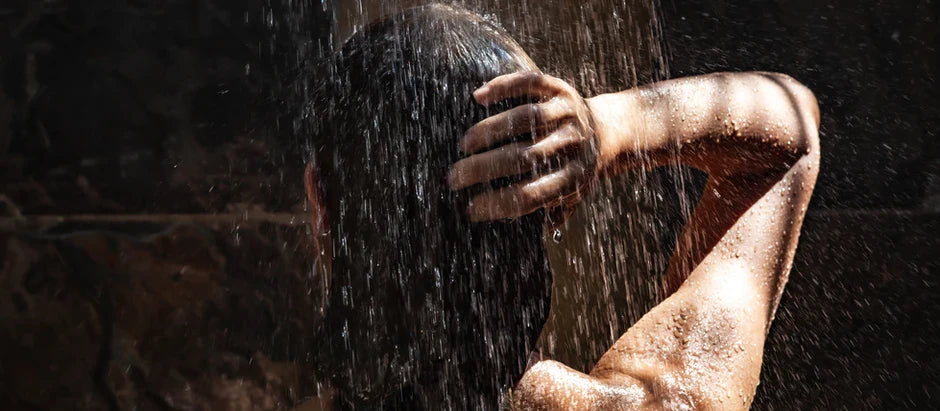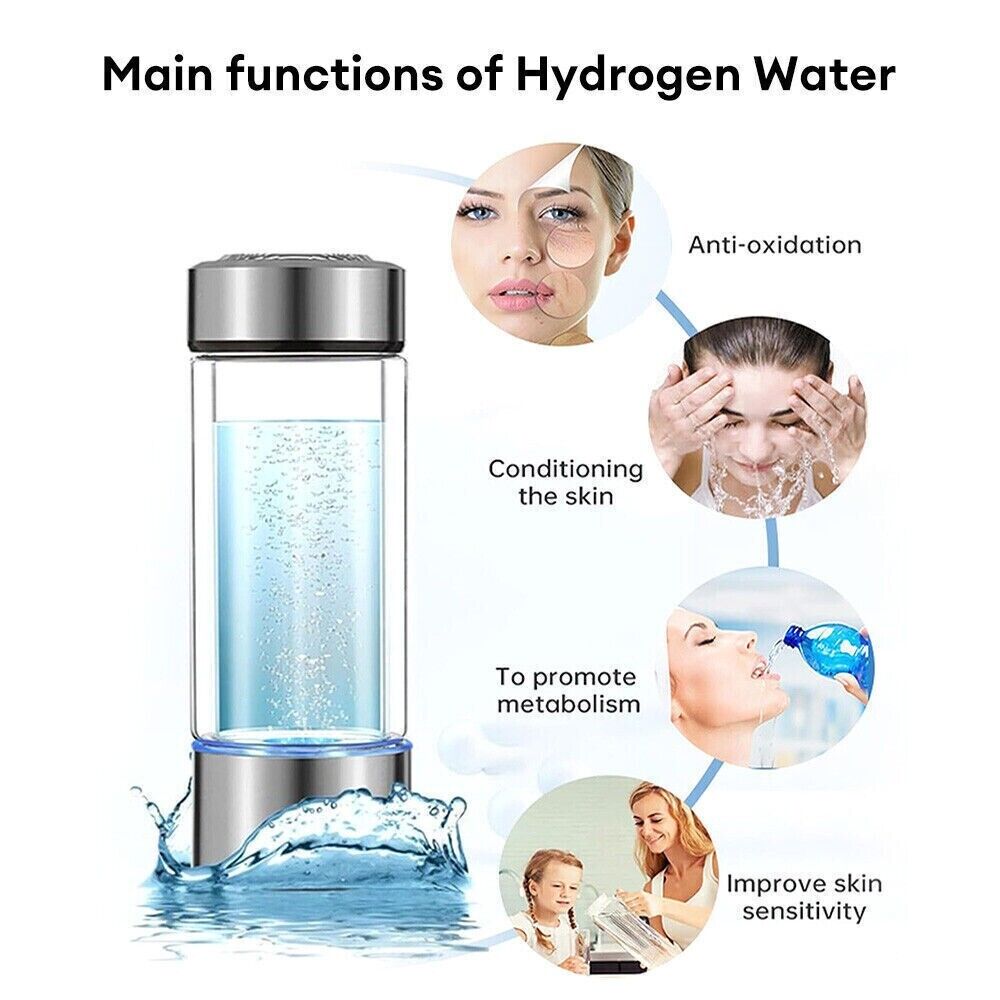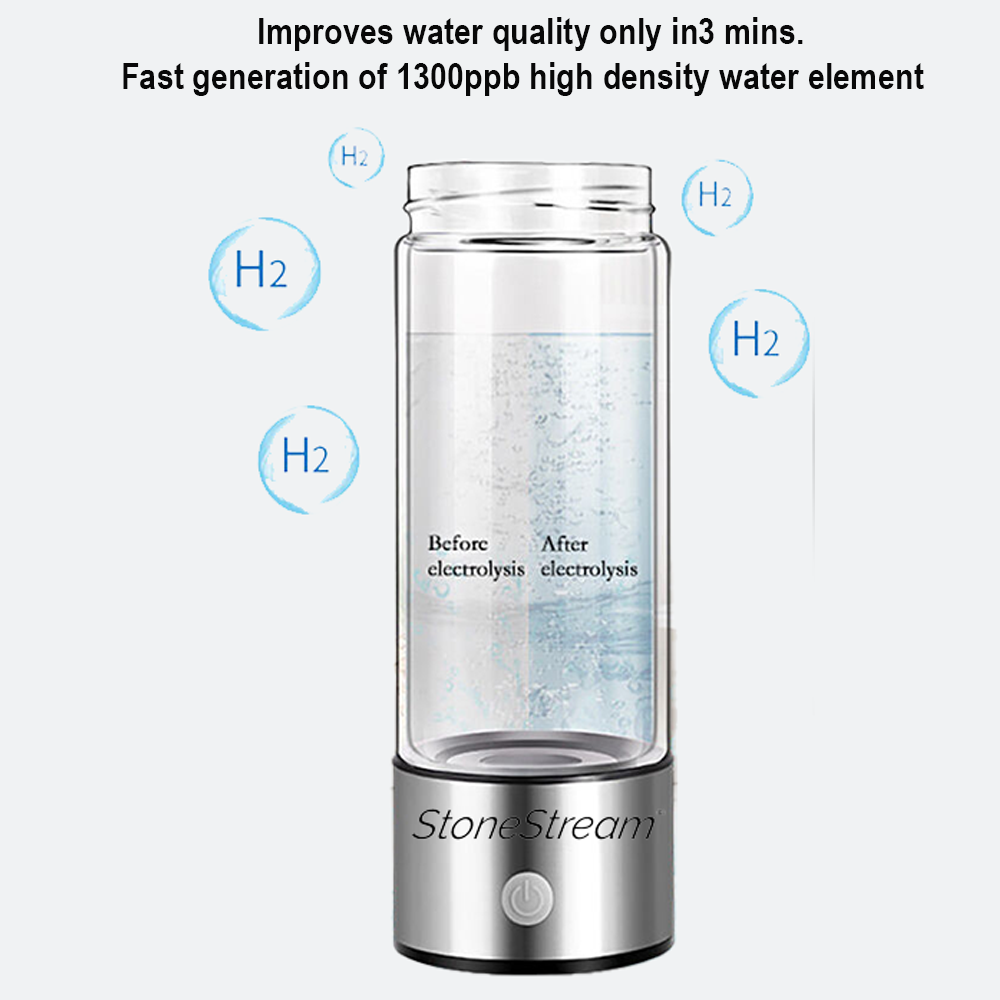Wasser, Wasser überall… und nicht alles ist gleich.
Richtig, eine Reihe von Faktoren – wie die geografische Lage, der Zustand des Sanitärsystems Ihrer Gegend und die Art der Wasseraufbereitung – bestimmen die Art des Wassers, das in Ihren Leitungen zu Hause fließt. Wenn Sie wie wir Wert auf eine erfrischende und beruhigende Dusche legen, wissen Sie, dass hartes Wasser das Erlebnis oft ruiniert.
Lassen Sie uns also herausfinden, wie SieSie können hartes Wasser in weiches Wasser umwandelnr deine Dusche.
Was ist hartes Wasser? Warum ist es ein Problem?
Um zu verstehen, warum hartes Wasser ein Problem ist, müssen wir herausfinden genau, was hartes Wasser ist. Es ist wichtig, den Unterschied zu kennen zwischen hartes Wasser und weiches Wasser!
Im Wesentlichen Wasser mit einem hohen Gehalt an Calcium- und Magnesiumsalze — zusammen mit anderen Mineralien und Metallen — wird als hartes Wasser bezeichnet. Diese Mineralien können eine Reihe von Problemen verursachen, z. B. können sie das Aufschäumen von Seife aufgrund von Seifenschaum erschweren, schwer zu entfernende Ablagerungen in Sanitäranlagen hinterlassen, Allergien auslösen und das effiziente Reinigen von Kleidung erschweren.
Obwohl hartes Wasser nicht unbedingt gesundheitsschädlich ist (es kann oft bedenkenlos getrunken werden!), kann es bei Aktivitäten im Badezimmer zweifellos ein Ärgernis sein. Insbesondere kann hartes Wasser Haut- und Haarprobleme verursachen, wie zum Beispiel Allergien, Hautausschläge und Trockenheit.
Das Kalzium im harten Wasser setzt sich auf der Haut ab und verstopft die Poren, was zu mehreren der oben aufgeführten Probleme führt. Außerdem kann das Haar dadurch seinen natürlichen Glanz und seine Weichheit verlieren.
Außerdem müssen Sie bei hartem Wasser mehr Seife verwenden, um sich richtig zu reinigen. Wasser mit einem so hohen Mineralgehalt kann auch Ihre Badezimmerarmaturen, Duschzubehör, Wände, Fliesen und Böden beschädigen.

Alles in allem erschwert hartes Wasser den Genuss einer wohltuenden Dusche!
Es ist auch wichtig zu wissen, dass es zwei Arten von Wasserhärte gibt: temporäre Härte und permanente Härte.
Temporäre Härte entsteht durch Calcium- und Magnesiumcarbonate und -bicarbonate; diese Art von Härte kann leicht behandelt werden. Permanente Härte hingegen wird durch Calcium- und Magnesiumsulfate und -chloride verursacht und ist schwieriger zu bekämpfen.
Und schließlich ist weiches Wasser aufbereitetes Wasser, das weitgehend frei von den oben genannten Mineralien ist. Tatsächlich ist weiches Wasser in den meisten Haushalten, Gewerberäumen und Industrieanlagen die bevorzugte Wahl, da es keine Schäden an der Ausrüstung verursacht und keine Ablagerungen hinterlässt.
Eine Dusche mit weichem Wasser ist sicherlich besser als eine Dusche mit hartem Wasser, da sie schonend für Haut, Haare, Kleidung und Rohrleitungen ist.
So verwandeln Sie hartes Wasser in weiches Wasser
Seien Sie versichert, es gibt verschiedene Möglichkeiten, Aus hartem Wasser weiches Wasser machen für Ihre Dusche oder Badewanne. Im Folgenden haben wir einige davon näher untersucht. Sehen Sie sich alle Methoden an und finden Sie heraus, welche Ihren Anforderungen und Bedingungen am besten entspricht.
1. Kochen Sie Wasser vor dem Duschen

Durch kochendes Wasser kann die vorübergehende Härte entfernt werden.
Dieser Schritt ist sicherlich der am wenigsten praktische, aber er funktioniert bei vorübergehender Wasserhärte. Wenn das Wasser in Ihrem Haus jedoch dauerhaft hart ist, hilft das Abkochen leider nicht. Um die Härte Ihres Wassers zu bestimmen, kaufen Sie einfach ein Testset für hartes Wasser.Testen Sie das Wasser vor und nach dem Kochen, um festzustellen, ob die Härte abgenommen hat. Handelt es sich um eine vorübergehende Härte, kann das Kochen hilfreich sein.
2. Backpulver ins Wasser geben
Backpulver ist ein üblicher Haushaltsbestandteil zur Bekämpfung der Wasserhärte.
Eine vorübergehende Lösung, die aber funktioniert. Geben Sie etwa eine halbe Tasse Backpulver in die Badewanne. Obwohl Backpulver das Wasser nicht vollständig enthärten kann, verändert es als alkalisches Mittel den pH-Wert von hartem Wasser, sodass es für Haut und Haar besser geeignet ist. Das Problem bei dieser Methode ist natürlich, dass Sie nicht wirklich duschen können, da Sie eine Badewanne benutzen müssen.
Sie können auch Backpulver verwenden, um Entkalken Sie Ihren schmutzigen Duschkopf Und Reinigen Sie Ihre Glasduschtüren.
3. Verwenden Sie Apfelessig

Apfelessig ist gut für Haut und Haar, für die Haushaltsreinigung und gegen hartes Wasser.
Dieser Schritt hilft Ihnen, die Auswirkungen von hartem Wasser nach dem Duschen zu bekämpfen.
Nehmen Sie Wasser aus der Flasche und geben Sie etwa zwei Esslöffel Apfelessig hinein. Verwenden Sie dies als letzte Spülung nach dem Duschen. Apfelessig ist sehr säurehaltig, gut für Haut und Haar und eignet sich hervorragend zum Entfernen von Ablagerungen, die durch hartes Wasser entstehen. Sie können auch ein paar Esslöffel Apfelessig in Ihr Badewasser geben. Und machen Sie sich keine Sorgen wegen des stechenden Geruchs, er verdunstet nach einer Weile!
Sie können auch Essig verwenden, um Reinigen Sie Ihre verstopften Duschköpfe!
4. Installieren Sie ein Wasserenthärtungssystem

Ein Wasserenthärtungssystem mit Ionenaustausch.
Ein Wasserenthärtungssystem für den Hausgebrauch bekämpft hartes Wasser – ja, insbesondere dauerhaft hartes Wasser – für Sie jeden Tag. Obwohl dieser Kauf Ihren Geldbeutel erheblich entlastet, ist es eine effektive Möglichkeit, hartes Wasser in weiches Wasser umzuwandeln. Sie können entweder ein Ionenaustausch-Wasserenthärter, das am häufigsten verwendete System, oder ein salzfreies System, oft als Wasseraufbereiter. Wenden Sie sich an Ihren Klempner, um zu entscheiden, welches System für Sie am besten geeignet ist.
5. Installieren Sie einen Duschkopf mit einem Hartwasserfilter
Der universelle Duschfilter von StoneStream macht das Wasser weicher.
Um weiches Wasser in Ihrer Dusche zu erhalten, sollten Sie sich am besten um den Duschkopf selbst kümmern. hochwertiger Duschkopf mit eingebautem Hartwasserfilter sorgt dafür, dass Sie bei jeder Dusche weiches Wasser bekommen. Ein Wasserenthärter im Duschkopf ist eindeutig die einfachste Methode, um mit hartem Wasser umzugehen. So haben Sie weiche Haut, gesundes Haar und ein sauberes Badezimmer und sparen auf lange Sicht viel Zeit und Geld.
Und wer kennt sich mit Multifunktionsduschköpfen besser aus, wenn nicht StoneStream?
Der beste Weg, hartes Wasser zu bekämpfen
Inzwischen ist Ihnen sicher klar geworden, dass der erfolgreiche Umgang mit hartem Wasser keine Kleinigkeit ist. Es ist unglaublich schwierig, einfache und bequeme Möglichkeiten zu finden, hartes Wasser zu Hause in weiches Wasser für die Dusche umzuwandeln.
Wir versichern Ihnen jedoch, dass StoneStream Duschköpfe sind wirklich die beste Lösung, um hartes Wasser in der Dusche zu bekämpfen. Wenn Sie also einen Duschkopf mit Wasserenthärter suchen, sind Sie hier richtig.

StoneStream-Duschköpfe enthärten Ihr Duschwasser.
Die drei Arten von Germaniumsteinen in den StoneStream-Duschköpfen bilden ein wirksames Filtersystem, das hartes Wasser weicher macht und Ihnen bei jeder Dusche ein wohltuendes Erlebnis bietet.
Mit unserem gefilterten Duschkopf für hartes Wasser können Sie überall wirklich quellähnliches Wasser genießen. Keine Seifenverschwendung mehr, keine schuppige Haut, kein brüchiges Haar, keine lästigen Kalkablagerungen und keine unansehnlichen Wasserflecken mehr!
Darüber hinaus bietet StoneStream Universeller Duschfilter für hartes Wasser ist einer der besten Duschfilter für hartes Wasser und nutzt einen 15-stufigen Filterprozess, um Verunreinigungen wie Chlor, Bakterien, Schmutz, Rost, Sand, Kalk und Schwermetalle gründlich zu entfernen.
Wir legen Wert auf Effizienz und Erschwinglichkeit, sodass Sie sich keine Sorgen machen müssen, Ihr Bankkonto zu sprengen. Außerdem sind StoneStream-Duschköpfe umweltfreundlich – Sie können weiches Wasser genießen und gleichzeitig Wasser sparen. Im Ernst, unsere Duschköpfe sind viel besser als herkömmliche Duschköpfe!
Kasse unsere Website Kaufen Sie noch heute einen hochwertigen Duschkopf für hartes Wasser und verabschieden Sie sich für immer vom harten Wasser in der Dusche!
StoneStream Universal-Duschkopf-Wasserfilter

Jetzt kaufen





